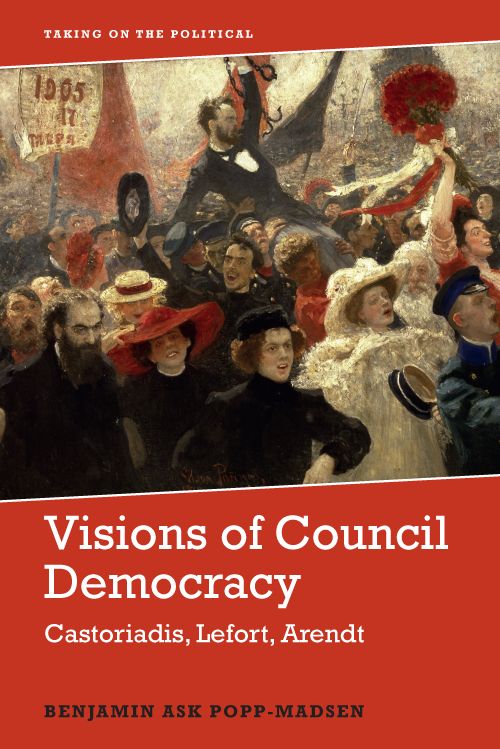
By Benjamin Ask Popp-Madsen

When I first grappled with the questions that would in time turn into my Edinburgh University Press book Visions of Council Democracy: Castoriadis, Lefort, Arendt, popular movements across Europe and the US, such as Occupy Wall Street and the Indignados in Spain, were protesting against the hard austerity politics following the global financial crisis of 2008-09. Although these popular movements did not succeed at establishing ‘Real Democracy Now!’, as some protesters hoped, I was left with many unresolved questions: What are genuinely democratic alternatives to liberal democracy? How to create such alternatives? What is the inspiration one can draw on to think beyond liberal democracy?
Thought Experiments, Utopias and Historical Events
In the history of political thought, it has been common to imagine a perfect polity. In one of the oldest political treatises of the Western world, in the Republic, Plato imagines a hypothetical city with the name of Kallipolis (meaning beautiful city), in which philosophers rule as kings in an ideal polity of perfect justice. Famously, Thomas More published his Utopia (literally meaning no place) in 1516, in which he imagined a perfect city-state on a desolated island. Such thought experiments also played a vital role in 20th century political thought. For example, in the main treatise of normative liberal political theory, John Rawls’ Theory of Justice (1971), in which Rawls imagined the ideal distribution of rights if decided upon behind a hypothetical ‘veil of ignorance’, where no individual would know her position in society after the distribution of rights.

While these utopias are certainly thought-provoking, they tell us little about the feasibility of their political institutions and give us sparse information on what human beings are actually capable of. To approach the questions of viable democratic alternatives to liberal democracy, and from where to get inspiration to create such alternative political structures, we might turn to history – to the half-forgotten practices and hopes of various historical actors. As argued by political thinker Hannah Arendt, one of the main actors of my book:
“Events, past and present, – not social forces and historical trends, nor questionnaires and motivation research, nor any other gadgets in the arsenal of social science – are the true, the only reliable teachers of political science, as they are the most trustworthy source of information for those engaged in politics.” [i]
This fidelity to historical events in my search for democratic alternatives to liberal democracy led me to the movements of workers’ councils, which were so incredibly influential in Europe during the first quarter of the 20th century, but which are virtually forgotten today.
Workers’ Councils, Revolution and Marxism
Workers’ councils, also knowns as soviets, appeared simultaneously in many European countries from 1905-1921, including Russia, Germany, Hungary and Italy. The emergences of workers’ councils were spontaneous, and although in no way unison in their political demands, the general program of the council movements was a deepening of democracy, a democratisation of the capitalist economy, a dismantling of the bourgeois state apparatus and the introduction of self-government in many aspects of social, economic and political life. Although these council movements were crucial in bringing the Russian, German and Austro-Hungarian empires to an end after WW1, they did not survive as the nascent council systems were replaced by either parliamentary democracies or communist dictatorships.

After a long period from the mid-1920s to the 1960s, political theorists started to re-discover the council movements as workers’ councils again appeared in the Hungarian Revolution of 1956. From the outset of this re-emergence, political theorists attempted to turn the council experiences into theories of radical democracy, conceptualised directly as alternatives to liberal democracy and Soviet communism. Visions of Council Democracy is predominantly an analysis of the three most influential attempts to utilise the council tradition to develop novel theories of democracy, namely the theories of council democracy developed by Cornelius Castoriadis, Claude Lefort and Hannah Arendt.
These thinkers are extremely important because the council system in their writings is transposed from a Marxist discourse to the discourse of democracy. As such, the historical councils primarily emerged as working-class institutions. Subsequently, the theoretical interpretations of the council system were primarily carried out by Marxist thinkers, who often saw the council system as partaking in a debate within the European labour movement and the means of revolutionary transformation. With Castoriadis, Lefort and Arendt’s visions of council democracy, the council system gradually loses its exclusive location within Marxism. Instead, it becomes paradigmatic for general questions of politics, society’s self-transformation and democracy. Their visions of council democracy come to speak to problems that characterise political modernity and not just working-class politics. Questions of totalitarianism, bureaucracy, autonomy, constitutionalism, freedom, conflict, alienation, and democracy.
Council Democracy Today?
So, can we learn anything from the 20th century workers’ councils and their later re-interpretations by political thinkers? My book argues that from the workers’ councils, we can learn that completely different ways of institutionalising democracy compared to contemporary liberal democracy have not only been imagined by philosophers but that such alternative experiments have been practised. The fact that workers’ councils existed, and that they relied on widespread popular participation instead of only periodic elections and representation, testifies to the actual possibility of creating genuine democratic alternatives to a liberal democratic system, which is currently under pressure. While the workers’ councils cannot function as a direct blueprint, the legacies of the council system could come to shape the future of democracy which in its present crisis might only survive by being radicalised.
[i] Hannah Arendt, 1958, ‘Totalitarian Imperialism: Reflections on the Hungarian Revolution, The Journal of Politics, vol. 20 (1), p. 8.
This book examines the historical emergence of the council system in Russia and Germany by the end of the First World War, reconstructing the intellectual history of council democracy in 20th century political theory, and providing in-depth analysis of council democracy in the political thought of Cornelius Castoriadis, Claude Lefort and Hannah Arendt.

Benjamin Ask Popp-Madsen is a postdoctoral fellow at the Department of Management, Politics and Philosophy at Copenhagen Business School. He has published on workers’ councils, democracy and political theory in Political Theory, Polity, Critical Horizons and Contemporary Political Theory.






